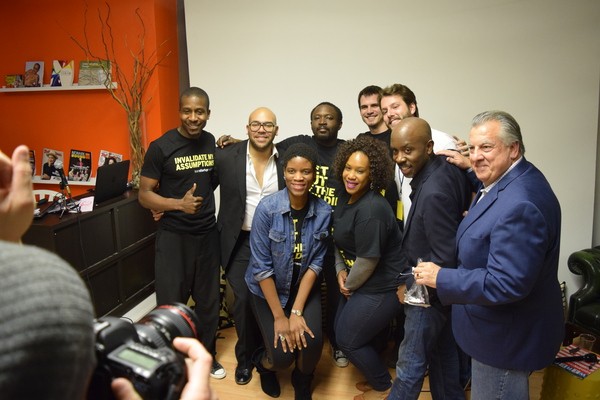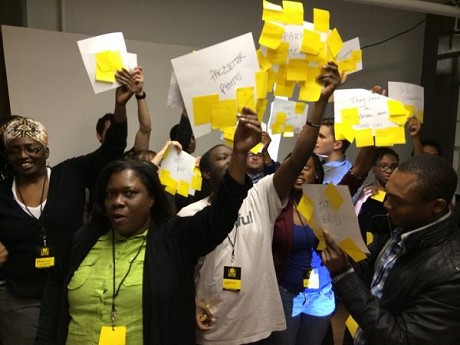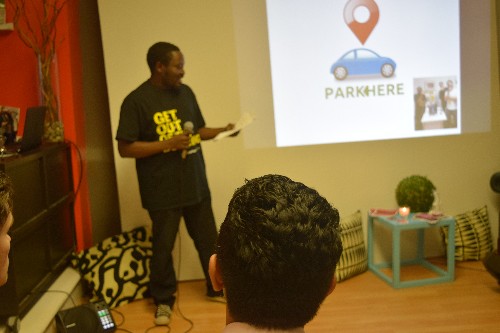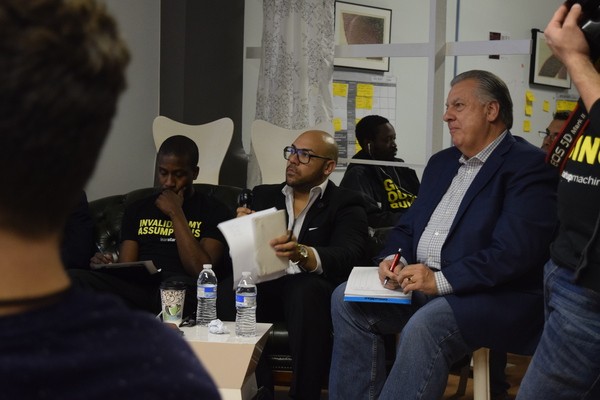Enthusiastic Entrepreneurs “Get Out of the Building” and “Fail Fast” at Lean Newark

The entrepreneurs hanging out at a hip coworking space in the middle of Newark during a windy weekend were all there to learn one counterintuitive business skill: to fail, and to fail quickly.
That’s because, as the attendees of the third annual Lean Startup Machine Newark workshop also learned, failing faster actually opens the door to success.
“Eighty percent of businesses fail within the first 18 months,” workshop founding organizer April Peters told the attendees. “This is an opportunity for you to fail quickly, so you can avoid some of the pitfalls of launching something and not testing it.”
Over 35 entrepreneurs participated in the Lean Newark workshop on November 7-9, taking over the =Space coworking facility in Newark, to the delight of Sean Hairston and Medina, both from MEDINA = CITI design house, who had recently opened the Market Street space.
Some of the attendees were startup veterans, while others had only just begun to learn about Lean. They all mixed with co-organizers Emily Manz, of the Brick City Development Corporation, and Melissa S. Jackson; over two dozen mentors; and half a dozen guest speakers.

One of the mentors, Steve Royster, formerly of the New Jersey Economic Development Authority and currently with Kiswe Mobile (Murray Hill), and whom many locals credit as a leader in bringing Lean to Newark, explained what Lean teaches.
“You read a lot of headlines, and it seems like it’s just magic and a light bulb and this myth of the magical entrepreneur coming up with an idea, and it really doesn’t happen that way,” he said.
“What you don’t see is the iterative process of failing and learning. Lean puts it in a framework that allows you to order your steps. It doesn’t give you any silver bullets, but it helps you understand the process of how to go from an idea to a product.”
Friends and former coworkers Andrae Gray and Jarel Hawkins, both engineers by training, came to the workshop because they were interested in learning more about starting a business.
“We’ve always had an entrepreneurial spirit,” Gray said. “[Hawkins] had a friend who came here and talked a lot about it, and we saw there was an opportunity in Newark, so we signed up.”
“We both left the [former] company within months of each other, and the one common bond we’ve had is discussing what’s next,” said Hawkins, who has a startup, EcoSOLElution, that sells green shoe-cleaning products. “I’ve been joking with everyone that I left work to come learn. Engaging in conversation and being around entrepreneurs is key to me.”

Another attendee, Raymond Rivera, started hearing about Lean only within the past year, and the workshop was his first event. “I’m here to get more knowledge on the Lean startup process,” he said. “I know that it’s going to be a fun-filled three days of learning and engaging customers in the street.”
Several groups partnered with the workshop, including EFACTOR (San Francisco), The Newark Times, PaceSetter Photography (Newark), My Subject Matte’rs, Brick City Live (Newark), The Phat Startup (New York), Google Developer Group North Jersey (Montclair), American Entrepreneurship Today (Westfield), and Indiegrove (Jersey City). As one of the event’s sponsors, =SPACE served as the workshop’s headquarters. (Note: NJTechWeekly.com was also a sponsor.)
Royster and the other mentors formed a diverse group. Peters said she was pleased to recruit a significant number of women. She also said that, during the workshop, she and several mentors discussed the possibility of forming a standing mentorship group to help new entrepreneurs.
The guest speakers included Ajay Perumal, founder of Text My Face, who gave an introduction to Lean, as well as a demo of the Javelin Experiment Board; Jimi Olaghere, cofounder of Geek Supply (Newark), who spoke about the Concierge MVP; and Kevin Selhi, cofounder of Griot Apparel (Brooklyn), who spoke about the best practices for solution validation.
Jay Jacobs, cofounder of the Shurn Group (West Orange), gave the workshop’s keynote speech, which was about his transition from a finalist on “The Biggest Loser” television show to a product strategist.
The workshop attendees also heard from Mark Annett, founder of Snack Builder and winner of the 2013 Lean Startup Machine Newark workshop. He made two presentations: a case study on winning and a discussion of the best practices for customer interviews. And they heard from Stacee Mandeville, of Red Leaf Coaching, who gave the workshop’s first presentation, on how to make a perfect pitch.
Mandeville, a stage actor by training, said that while most entrepreneurs practice what they say in pitches, they seldom practice how they pitch. She cited two important aspects of body language, the first being eye contact. “It is your most powerful physical tool,” she said. “Really good eye contact is extended, connected and deliberate.”
She also stressed pausing. “Where you look, and for how long, affects what people think of what you say,” she said. Mandeville explained that pausing allows the audience to process their thoughts, and the speaker to process thoughts, avoid unnecessary filler words like “um” and “uh” and to conceal any mistakes.
After Mandeville spoke, the attendees pitched their startup ideas in 50-second bursts, which ranged from the everyday (finding clothes on sale, reselling college books) to the high tech (an interactive and instructional stuffed animal, an app for renting parking spaces) and to the socially aware (reducing the prison population, making mammograms less painful).
On Saturday, the entrepreneurs broke up into teams and began working on some of the pitched ideas. They created minimum viable products like basic websites, and they practiced customer development by following the Lean motto to “get out of the building” and talk to real potential customers on the streets of Newark.

On Sunday, the attendees picked the parking app ParkHere as the winning project. The attendees, mentors and organizers also tweeted a lot; together they beat Rome and Washington, D.C., in a social media competition judged by the national Lean umbrella group.
Gray, who worked on the interactive stuffed animal, said the weekend was long and exhaustive, but also instructive. “It was great working with my teammates and being able to go through the learning cycle with a room full of eager learners,” he said. “Overall, I learned the value of validating your business idea before entering the final stages.”
Newcomer Rivera, who was involved with the same project, learned about forming a startup team, talking to potential customers, and pivoting to better ideas. Overall, he found the workshop weekend to be a valuable experience. “I just wished I would have participated in a Lean Startup Machine event sooner,” he said.

